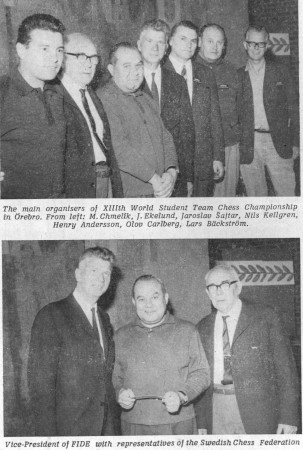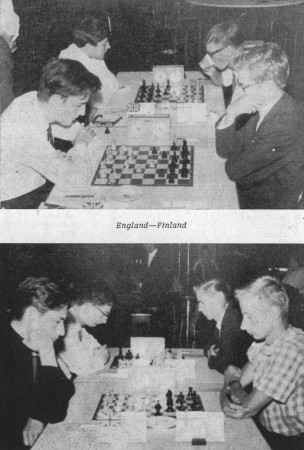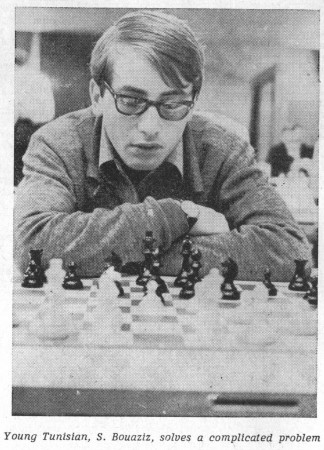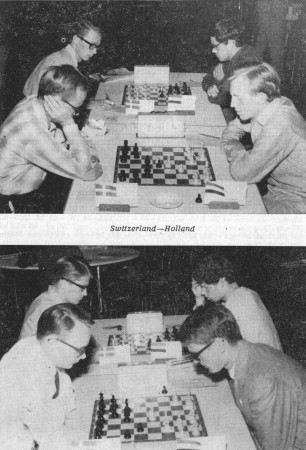After an interval of ten years, the Swedish Chess Federation, together with the Örebro Chess Association, the Swedish Academic Chess Associations, and the International Union of Students, organised the 13th Annual World Student Chess Championship, under the patronage of the International Chess Federation (FIDE). The last championship, organised by Sweden, was held in the well-known university town of Uppsala in 1958. This year's championship took place from July 30th to August 14th, 1966 in Örebro, central Sweden, some 200 kilometres from Stockholm.
Once again the fact was established that the World Student Championship has taken root and is meeting with growing interest on the part of the world's student chess players. Also, as far as the general international activity of FIDE is concerned, this event ranks — after the Chess Olympiades — among the most important organised by the International Chess Federation.
Altogether, 21 teams were present at the opening ceremony in Örebro, the same as the record number which met in Cracow in 1964. Among the participants attending the World Student Championship, were students from Switzerland and Puerto Rico, whom we welcomed.
 The Championship opened at the "Club 700". The participants were greeted by the President of the Swedish Chess Federation and deputy of the Riksdag (Swedish Parliament), Mr. Nils Kellgren. Following the speeches made by the representative of the town of Örebro, Mr. Gunnar Ignell, the Director of the Championship, Vice-President of the Swedish Chess Federation, Mr. J. E. Ekelund, and the IUS representative, Mr. Chmelík FIDE President Folke Rogard declared the 13th World Chess Championship open.
The Championship opened at the "Club 700". The participants were greeted by the President of the Swedish Chess Federation and deputy of the Riksdag (Swedish Parliament), Mr. Nils Kellgren. Following the speeches made by the representative of the town of Örebro, Mr. Gunnar Ignell, the Director of the Championship, Vice-President of the Swedish Chess Federation, Mr. J. E. Ekelund, and the IUS representative, Mr. Chmelík FIDE President Folke Rogard declared the 13th World Chess Championship open.
At a captains' meeting the teams were divided into six groups. It is undoubtedly interesting that speculation was quite accurate. Most captains expected the Soviet Union to capture first place and Czechoslovakia second. Except for the Puerto Rican team, which was participating in the championship for the first time and whose game was absolutely unknown, the difference between the estimated scores of the various teams and the final scores averaged two points at most.
The final results of the preliminary groups were not as surprising as they had been in years past. All favourites advanced to the final A group. This doesn't mean, however, that these groups' games failed to arouse interest. In the first group, the Soviet team took first place in a remarkable performance; second place was taken by Finland, after a draw with Sweden (2-2), owing to the advantage obtained in the match with the USSR. In the second group, too, victorious Czechoslovakia played a masterly game, whereas the Netherlands scored second place only after closely defeating Iceland. In the third group the matches were even closer; here the Cubans showed clearly that they were a dangerous, closely-knit team. In the fourth group, both favourites — England and Israel — advanced without difficulty, and in the remaining groups problem in scoring.
 In final A group, the fight for first place was quickly decided upon. The Soviet students started energetically, placed well ahead of the other teams, and triumphed effortlessly. Their victory was well deserved; all members of the team did their best to achieve it. They showed themselves to be a well-equilibrated group, playing tenaciously, dynamically, and enthusiastically. Whenever a replacement was brought in, this by no means weakened the team's efficiency. This was also proved by the second substitute, Tukmakov, who scored 9 points during his 9 games; this 100 % achievement made him the most successful individual player in the entire championship. On the second chessboard, the most successful Soviet representative was Kuzmin; on the fourth chessboard the Soviet student, Kapengut, also played splendidly. Thus, the Soviet students defended the world championship title they obtained last year. Apart from the gold medals, they also definitely won the cup donated by the Yugoslav student organisation at Budva in 1963. According to the decision of the FIDE Congress, this Challenge Cup remains the final property of the team which becomes world champion three times in succession. This the Soviet student team has now achieved. It was also victorious in Cracow in 1964, and in Sinaia last year.
In final A group, the fight for first place was quickly decided upon. The Soviet students started energetically, placed well ahead of the other teams, and triumphed effortlessly. Their victory was well deserved; all members of the team did their best to achieve it. They showed themselves to be a well-equilibrated group, playing tenaciously, dynamically, and enthusiastically. Whenever a replacement was brought in, this by no means weakened the team's efficiency. This was also proved by the second substitute, Tukmakov, who scored 9 points during his 9 games; this 100 % achievement made him the most successful individual player in the entire championship. On the second chessboard, the most successful Soviet representative was Kuzmin; on the fourth chessboard the Soviet student, Kapengut, also played splendidly. Thus, the Soviet students defended the world championship title they obtained last year. Apart from the gold medals, they also definitely won the cup donated by the Yugoslav student organisation at Budva in 1963. According to the decision of the FIDE Congress, this Challenge Cup remains the final property of the team which becomes world champion three times in succession. This the Soviet student team has now achieved. It was also victorious in Cracow in 1964, and in Sinaia last year.
Czechoslovakia scored second place. The team's silver medals constitute an appreciable success on the part of the CSSR's team, which played enthusiastically and imaginatively. Their part in the final group was not too good. After a draw with the Yugoslav team, they suffered a defeat from the Danes, who played excellently. In further matches however, they were victorious, except for that with the USSR, in which they were defeated. The fight for second place was very dramatic until the final hours of the championship. In the last match with the Israeli team, the score 2-2 was not enough. In this situation, the Czechoslovaks, with the same number of points as the Danes and Yugoslavs, would have ranked last in the classification because of the results of the various games, and would have had to settle tor fourth place. But thanks to their 3-1 victory, they safely moved into second place. Czechoslovakia's success was mainly due to the excellent performance of Grandmaster Hort, who was also the principal individual victor on the first chessboard. Smejkal had also improved considerably since last year; in the individual rating he proved to be the third best player on the third chessboard.
 The Danish students' success was fully deserved and confirmed that their third place last year was not a matter of chance. The whole team played enthusiastically. Although it could not boast of outstanding individual players, the group was well balanced. First substitute, Moe, achieved the best individual results on the first substitutes' chessboard. Yugoslavia gained the same number of points as the Danes. Only defeat in the various matches caused their drop to fourth place. The Yugoslav students started in the victorious group with poorer results. But they plunged into the finals with spirit, and in the end were serious contestants for one of the medals. On the team, the performance of junior world champion Kurajica was somewhat weak. Rajković and Cebalo played excellently. The rest of the team members played only an average game. Fifth place was scored by the students of the Rumanian Socialist Republic. After their outstanding victory in the preliminary group, they were expected to be candidates tor one of the medals. But in the final group, their game dropped steadily and not even the fine performance of Grandmaster Gheorghiu on the first chessboard could offset the average playing of the rest of the team.
The Danish students' success was fully deserved and confirmed that their third place last year was not a matter of chance. The whole team played enthusiastically. Although it could not boast of outstanding individual players, the group was well balanced. First substitute, Moe, achieved the best individual results on the first substitutes' chessboard. Yugoslavia gained the same number of points as the Danes. Only defeat in the various matches caused their drop to fourth place. The Yugoslav students started in the victorious group with poorer results. But they plunged into the finals with spirit, and in the end were serious contestants for one of the medals. On the team, the performance of junior world champion Kurajica was somewhat weak. Rajković and Cebalo played excellently. The rest of the team members played only an average game. Fifth place was scored by the students of the Rumanian Socialist Republic. After their outstanding victory in the preliminary group, they were expected to be candidates tor one of the medals. But in the final group, their game dropped steadily and not even the fine performance of Grandmaster Gheorghiu on the first chessboard could offset the average playing of the rest of the team.
Greater hopes were held out for the Israeli team, which placed first last year. The absence of last year's most successful player, Bleiman, was strongly felt. The English team placed quite well, even if more was expected from them, and especially the leading player and team captain, Lee. The chess players from the GDR certainly came to the championship with greater ambitions than was shown by their final rating on the tournament score-board. In their team game, the results of leading player, Hennings, did not come up to expectations. The placing of the Bulgarian and Hungarian students, as well of those from Holland and Finland, on the whole corresponded to their capacities.
 In the final group B, the Swedish host team, who regularly attend and play in all world student championships held, have so for reaped well deserved success. Their placing at home this year is the best thus far. The Cuban team's success was also a pleasant surprise. They placed second in group B. The mainstays of the team were Rodriguez, García and Lebredo. Another representative of Latin America — the Puerto Rican team — also did well. One of its members, Kaplan, even became individual victor on the third chessboard, scoring 8½ points in 11 games. The Scots also surprised us with their fine placing. Other newcomers — the Swiss students — played more or less as expected. More might have been expected from the Icelandic and Tunisian teams. At the bottom of the score-board were Belgium and Iraq. Yet in general it must be said that all the teams' games, compared with preceding championships, are improving year after year, and this, in my opinion, constitutes another positive aspect of these World Student Championships.
In the final group B, the Swedish host team, who regularly attend and play in all world student championships held, have so for reaped well deserved success. Their placing at home this year is the best thus far. The Cuban team's success was also a pleasant surprise. They placed second in group B. The mainstays of the team were Rodriguez, García and Lebredo. Another representative of Latin America — the Puerto Rican team — also did well. One of its members, Kaplan, even became individual victor on the third chessboard, scoring 8½ points in 11 games. The Scots also surprised us with their fine placing. Other newcomers — the Swiss students — played more or less as expected. More might have been expected from the Icelandic and Tunisian teams. At the bottom of the score-board were Belgium and Iraq. Yet in general it must be said that all the teams' games, compared with preceding championships, are improving year after year, and this, in my opinion, constitutes another positive aspect of these World Student Championships.
The Swedish Chess Federation staged the thirteenth of these annual world championships very satisfactorily, thanks to the laudable efforts of all those who enthusiastically volunteered to help in this work. First and foremost we owe thanks to the tireless, 76-year-old Vice-President of the Swedish Chess Federation, Jakob Ekelund. As Director of the tournament, he, together with his closest collaborators, Henry Andersson, Olov Carlberg, Lars Bäckström, and others, created the best conditions for the championship participants, within the framework of the possibilities at their disposal, so that the matches on 64 chessboards could proceed in a spirit of sound, friendly, sporting competition. As main referee of the entire championship, I was able to state at the conclusion, with great pleasure and satisfaction, that this championship proceeded without a single protest, a fine testimony to the good sportsmanship of all its participants.
 In view of the large number of participating teams, it was necessary to play daily, hence the participants were able to acquaint themselves with the picturesque town of Örebro only at the beginning, when a sightseeing tour by bus was organised. They visited the watch-tower, architecturally executed in an interesting way, and enjoyed the wonderful view of the town and its surroundings from the top.
In view of the large number of participating teams, it was necessary to play daily, hence the participants were able to acquaint themselves with the picturesque town of Örebro only at the beginning, when a sightseeing tour by bus was organised. They visited the watch-tower, architecturally executed in an interesting way, and enjoyed the wonderful view of the town and its surroundings from the top.
The 13th World Championship ended on Sunday, August 14th, with a festive proclamation of the winners and the awarding of medals and prizes by FIDE President Folke Regard. All participants bid good-bye to Örebro and Sweden, taking the best impressions home with them. They left for their countries with recollections of the hospitable and industrious Swedish people and undoubtedly look forward with pleasure to meeting again at the 14th Annual World Student Championship, to be held in the Czechoslovak Socialist Republic in 1967.
/ Ing. Jaroslav Šajtar, International Master and Vice-President of FIDE /